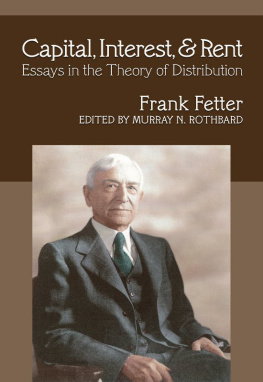EconomicsVolume II
MODERN ECONOMIC PROBLEMS
BY
FRANK A. FETTER, PH.D., LL.D.
PROFESSOR OF ECONOMICS, PRINCETON UNIVERSITY
1916
TO THE MOTHER WITH A YOUTHFUL HEART AND SYMPATHETIC INTEREST IN ALL THINGS HUMAN
TABLE OF CONTENTS
PART I. RESOURCES AND ECONOMIC ORGANIZATION.
1. Material resources of the nation
2. The present economic system
PART II. MONEY AND PRICES.
3. Nature, use, and coinage of money
4. The value of money
5. Fiduciary money, metal and paper
6. The standard of deferred payments
PART III. BANKING AND INSURANCE.
7. The functions of banks
8. Banking in the United States before 1914
9. The Federal Reserve Act
10. Crises and industrial depressions
11. Institutions for saving and investment
12. Principles of insurance
PART IV. TARIFF AND TAXATION.
13. International trade
14. The policy of a protective tariff
15. American tariff history
16. Objects and principles of taxation
17. Property and corporation taxes
18. Personal taxes
PART V. PROBLEMS OF THE WAGE SYSTEM.
19. Methods of industrial remuneration
20. Organized labor
21. Public regulation of hours and wages
22. Other protective labor and social legislation
23. Social insurance
24. Population and immigration
PART VI. PROBLEMS OF INDUSTRIAL ORGANIZATION.
25. Agricultural and rural population
26. Problems of agricultural economics
27. The railroad problem
28. The problem of industrial monopoly
29. Public policy in respect to monopoly
30. Public ownership
31. Some aspects of socialism
Index
FOREWORD
The present volume deals with various practical problems in economics, as a volume published a year earlier dealt with the broader economic principles of value and distribution. To the student beginning economics and to the general reader the study of principles is likely to appear more difficult than does that of concrete questions. In fact, the difficulty of the latter, tho less obvious, is equally great. The study of principles makes demands upon thought that are open and unmistakable; its conclusions, drawn in the cold light of reason, are uncolored by feeling, and are acceptable of all men so long as the precise application that may justly be made of them is not foreseen. But conclusions regarding practical questions of public policy, tho they may appear to be simple, usually are biased and complicated by assumptions, prejudices, selfish interests, and feelings, deep-rooted and often unsuspected.
No practical problem in the field of economics can be solved as if it were solely and purely an economic problem. It is always in some measure also a political, moral, and social problem. The task of the economist "as such" is the analysis of the economic valuation-aspects of these problems. We may recall Francis A. Walker's comparison of the economist's task with that of the chemist, which task, in a certain case, was to analyze the contents of a vial of prussic acid, not to give advice as to the use to make of it. Accordingly, in the following pages, the author has endeavored primarily to develop the economic aspects of each problem, and has repeatedly given warning when the discussion or the conclusions began to transcend strict economic limits. In many questions feeling is nine-tenths of reason. If the reader has different social sympathies he may prefer to draw different conclusions from the economic analysis.
The outlook and sympathies that are expressed or tacitly assumed throughout this work are not so much those personal to the author as they are those of our present day American democratic society, taken at about its center of gravity. When the people generally feel differently as to the ends to be attained, a different public policy must be formulated, tho the economic analysis may not need to be changed. Therefore, in some cases, the author has discussed merely the economic aspect, or has referred to the general principles treated in volume one, and has purposely refrained from expressing his personal judgment as to "the best" policy for the moment.
The present volume was planned some years ago as a revision of a part of the author's earlier text, "The Principles of Economics" (1904). The intervening years have, however, been so replete with notable economic and social legislation and have witnessed the growth of a wider public interest in so many economic subjects, that both in range and in treatment this work necessarily grew to be more than a revision. Except in a few chapters, occasional sentences and paragraphs are all of the specific features of the older text that remain. Suggestive of the rapid changes occurring in the economic field is the fact that a number of statements made in the manuscript a few months or a few weeks ago had to be amended in the proof sheets to accord with recent events.
The author's debt for information, inspiration, and assistance in various phases of the work is a large one. The debt is owing to many,authors, colleagues, and students. A few of the sources that have been drawn upon will be indicated in a pamphlet following the plan of the "Manual of References and Exercises in Economics," already published for use in connection with Volume I; but the limits of space will prevent a complete enumeration. I wish, however, in particular, to acknowledge gratefully the aid and friendly criticisms given in connection with the chapters on money and banking, on labor problems, and on the principles of insurance, respectively, by my colleagues, E.W. Kemmerer, D.A. McCabe, and N. Carothers.
In completing, at least provisionally, the present work, the author cherishes the hope that it will be of assistance not only to teachers and to students in American colleges, but also to citizen-readers seeking to gain a better and a non-partisan insight into the great economic problems now claiming the nation's conscience and thought.
F.A.F.
Princeton, N.J., October, 1916.
MODERN ECONOMIC PROBLEMS
PART I RESOURCES AND ECONOMIC ORGANIZATION
CHAPTER I
MATERIAL RESOURCES OF THE NATION
1. Politico-economic problems. 2. American economic problems in the past. 3. Present-day problems: main subjects. 4. Attempts to summarize the nation's wealth. 5. Average wealth and the problem of distribution. 6. Changes in the price-standard. 7. A sum of capital, not of wealth. 8. Sources of food supply. 9. The sources of heat, light, and power. 10. Transportation agencies. 11. Raw materials for clothing, shelter, machinery, etc.
1. #Politico-economic problems.# The word "problem" is often on our tongues. Life itself is and always has been a problem. In every time and place in the world there have been questions of industrial policy that challenged men for an answer, and new and puzzling social problems that called for a solution. And yet, when institutions, beliefs, and industrial processes were changing slowly from one generation to another and men's lives were ruled by tradition, authority, and custom, few problems of social organization forced themselves upon attention, and the immediate struggle for existence absorbed the energies and the interests of men. But our time of rapid change seems to be peculiarly the age of problems. The movement of the world has been more rapid in the last century than ever beforein population, in natural science, in invention, in the changes of political and economic institutions; in intellectual, religious, moral, and social opinions and beliefs.












